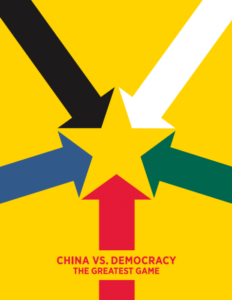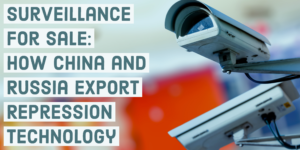 A bipartisan policy must take shape for the United States to “out-compete” China, U.S. Democratic Senator Chris Coons told Reuters on Friday.
A bipartisan policy must take shape for the United States to “out-compete” China, U.S. Democratic Senator Chris Coons told Reuters on Friday.
“Xi Jinping and the Chinese Communist Party are convinced that America’s in decline, that the United States and our system are broken and weakening,” he said referring to China’s leader. “It’s up to us to show that they are vibrant and strong and capable of solving problems.”
And if democratic countries cannot agree on common rules in the digital realm, China could end up setting the rules for large swathes of the world. The result would be a technosphere engineered for the comfort and support of autocracies, The Economist adds.
The urgency, scope, and complexity of the China challenge, which is likely to dominate U.S. foreign policy for many administrations, requires a “return to fundamentals,” according to a new report from the State Department’s Policy Planning staff. But while the document provides a nuanced diagnosis, it is short on prescriptions, some suggest, although two former State Department analysts advocate placating Beijing by ending assistance to China’s civil society.
A back-to-basics approach for the U.S. entails an obligation to “fortify the free, open, and rules-based international order that it led in creating after World War II, which is composed of sovereign nation-states and based on respect for human rights and fidelity to the rule of law,” say the authors of The Elements of the China Challenge, characterized by a recent Halifax International Security Forum (HFX) report as the new “Greatest Game.”
The CCP’s “discipline and ruthlessness have enabled it to marshal vast resources and patiently pursue the production of wealth at home and the acquisition of power and influence abroad.” Consequently, it is “unreasonable to suppose that today’s leaders of the Chinese Communist Party …… comprehend domestic politics and world affairs as do the United States and other liberal democracies,” it notes, observing that, in recent years, the CCP has:
 consolidated authority and — by nefarious means ranging from digital surveillance to strict indoctrination to concentration camps for religious and ethnic minorities – — intensified the subordination of PRC citizens to party-defined collective interests;
consolidated authority and — by nefarious means ranging from digital surveillance to strict indoctrination to concentration camps for religious and ethnic minorities – — intensified the subordination of PRC citizens to party-defined collective interests;- developed — and acquired illegally in many instances — advanced technologies not only to control its own population but also to collect data on persons across the globe and to build a world-class military;
- pursued extravagant claims in, and militarization of, the South China Sea in brazen defiance of international law while crushing freedom in Hong Kong and threatening to do the same in Taiwan;
- undertaken major infrastructure and investment projects, debt-trap diplomacy, and other predatory economic practices in every region of the world, the better to induce or compel sovereign nation-states, particularly their governing and business elites, to aid and abet China in the reshaping of world order;
- leveraged its integration into international organizations to infuse them with norms and standards rooted in the party’s authoritarianism.
In one respect, the threat resembles that presented by the Soviet Union during the Cold War. While the Soviets blended communism with traditional Russian chauvinism, Chinese authoritarianism “combines communism and a hyper-nationalist interpretation of China’s status and destiny,” the paper adds. But there is also a vital difference.

National Endowment for Democracy (NED)
“The harsh reality is that to advance vital U.S. interests and defend cherished American principles, the United States must maintain cooperative relations with a great power whose economy represents a hefty component of world commerce but whose systematic conduct deprives its own people of freedom and threatens the freedom of nations around the world,” the authors add.
Referencing U.S. diplomat George Kennan’s celebrated “Long Telegram,” which proposed to contain Soviet Communism, the document gets one important thing right: Have no illusions about transforming China into a Western-style democracy and must engage China as it is.
“Viewing the [regime’s] conduct in the context of the ideas that inspire and shape it dispels the starry-eyed optimism about the PRC that has distorted U.S. policy,” the analysis suggests. “It also encourages sobriety in cooperating with, containing, and deterring the CCP. Grasping China’s conduct in light of the CCP’s governing ideas, moreover, illuminates the vulnerabilities that afflict China’s authoritarian regime, and clarifies the tasks the United States must undertake to secure freedom.” RTWT
On the other hand, “it seems very unlikely that Beijing has any desire to export its socialism to the United States and Western democracies,” argues Andy Zelleke, a senior lecturer at Harvard Business School. “The CCP may well prefer a set of competitors wedded to what it views as far less effective ways of organizing their societies,” he writes for The Diplomat.
Nathan Law, a prominent pro-democracy activist who fled Hong Kong fearing persecution under the new national security law, is anticipating a global pushback against Chinese authoritarianism, he told Newsweek.
China says Five Eyes alliance will be ‘poked and blinded’ over Hong Kong stance https://t.co/XWun4cwqly
— Democracy Digest (@demdigest) November 20, 2020
But former State Department analysts Aaron David Miller and Richard Sokolsky favor a more timid, if not defeatist, approach.
“The new administration should publicly call out Beijing for its egregious human rights abuses—specifically the incarceration and persecution of Muslim Uighurs—while avoiding actions the Chinese leadership would perceive as aimed at regime change, such as providing assistance to Chinese civil society groups,” they write for POLITICO.
 The key question for any strategy to compete with China is: With our economy closely tied to an authoritarian power, our channels of communication infiltrated by surveillance technology and weaponized information, and the legitimacy of our liberal institutions questioned from within and without, how can the United States avoid an outright military conflict and remain a free and open society? Nicholas Romanow writes for The Bulwark.
The key question for any strategy to compete with China is: With our economy closely tied to an authoritarian power, our channels of communication infiltrated by surveillance technology and weaponized information, and the legitimacy of our liberal institutions questioned from within and without, how can the United States avoid an outright military conflict and remain a free and open society? Nicholas Romanow writes for The Bulwark.
China’s core institutions of totalitarianism have severely limited the political impact of the economic transformation brought about by four decades of reform and integration with the global economy, according to Claremont McKenna College professor Minxin Pei. They have paved the way for the potential return of a neo-Stalinist figure such as Xi, he will suggest when he delivers this year’s Lipset lecture, organized by the NED’s International Forum.
The Embassy of Canada and the National Endowment for Democracy present the seventeenth annual Seymour Martin Lipset Lecture on Democracy in the World.
FEATURING
 Dr. Minxin Pei, Pritzker Professor of Government and George R. Roberts Fellow, Claremont McKenna College on TOTALITARIANISM’S LONG DARK SHADOW OVER CHINA
Dr. Minxin Pei, Pritzker Professor of Government and George R. Roberts Fellow, Claremont McKenna College on TOTALITARIANISM’S LONG DARK SHADOW OVER CHINA
THURSDAY, DECEMBER 3, 2020 8:00 P.M. EASTERN TIME (Click here to find the event in your local time) RSVP BY FRIDAY, NOVEMBER 27
This event will be held virtually. All participants must register in advance to attend and will receive login instructions by email prior to the event. Please email press@ned.org to register as a member of the press.
How to Wage an Ideological Conflict with China https://t.co/0sEo0zFNcy via @BulwarkOnline
— Democracy Digest (@demdigest) November 20, 2020







